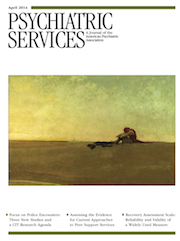Extended Mental Health Service Utilization Among Survivors of the Oklahoma City Bombing
Abstract
Objective
The study assessed survivors of Oklahoma City’s 1995 bombing seven years postdisaster to identify long-term mental health service use.
Methods
Psychiatric disorders and disaster-related variables were assessed for 99 survivors at seven years postdisaster with the Diagnostic Interview Schedule for DSM-IV and its Disaster Supplement.
Results
Of the 99 survivors, 86% received services during the seven years. Use was associated with female sex, injury or hospitalization, and posttraumatic stress disorder (PTSD) or major depression. Informal interventions were usually initiated in the first six months. Treatment by psychiatrists, other professionals, and family doctors increased after the first month. Half the survivors with PTSD or depression received treatment from a psychiatrist. Only 15% of survivors took psychotropic medications. Although 33% received treatment for more than one year, only 7% were receiving services at seven years.
Conclusions
Although service needs decreased over time, results support provision of diverse services adapted to changing needs.



